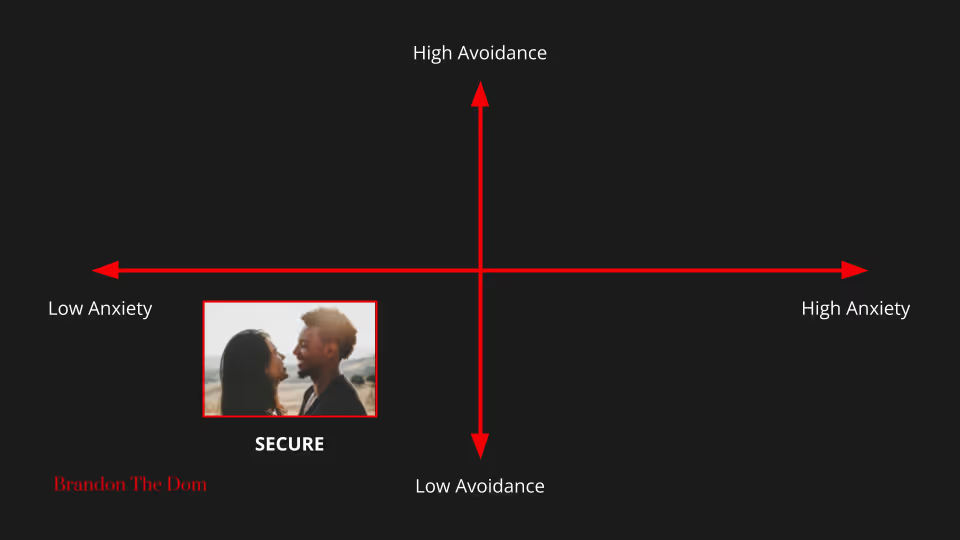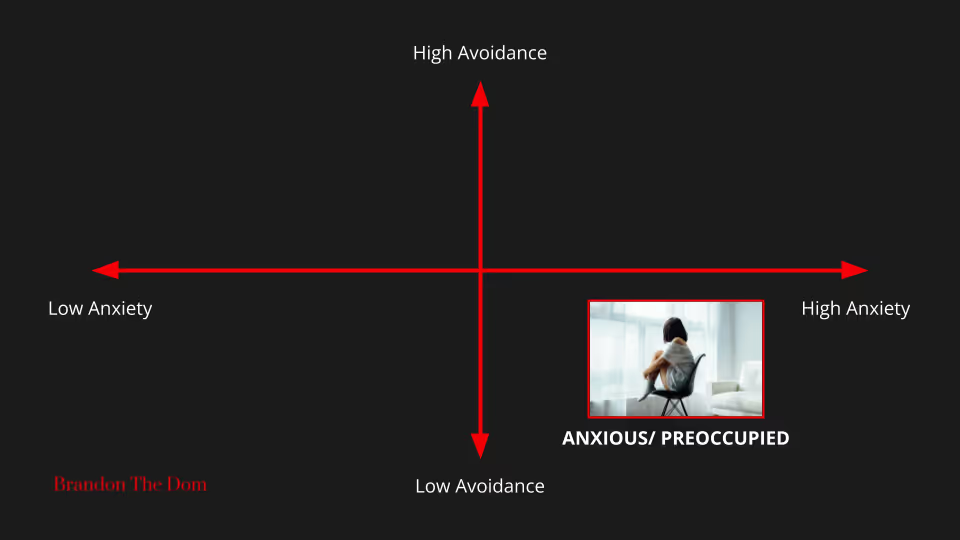Your Attachment Style is Impacting Your Relationships and Sex Life (Including Casual Sex)
What is your attachment style? Do you feel secure, or do you sometimes get told your clingy or maybe unavailable? Do you know how attachment styles effect your relationships and sex life? This article will cover everything you need to know about your attachment style and how to become more secure.
What is an attachment style?
We first recognize we are imperfect beings who have needs that must be fulfilled by others when we are a child. Depending on how our parents approached meeting those needs, we learned to be securely attached or insecurely attached.
A secure attachment is developed when parents are attuned, responsive, and do their best to satisfy all our needs and provide us with a warm and nurturing environment. Roughly two thirds of the U.S. population has a secure attachment.
An insecure attachment is developed when parents do not attend to needs and may be caused by misattuned parenting, childhood trauma, or abuse. One third of the U.S. population experiences some sort of attachment disturbance.
The behaviors we learn as a child in relationship with our parents become a pattern that we continue into adulthood with romantic partners and friendships. If we learned maladaptive behaviors, we may be insecure and have maladaptive adult relationships.
The four attachment styles
The continuous research on attachment theory dates all the way back to the 1950’s when 4 attachment styles were identified.
The four attachment styles are:
- Secure
- Anxious (also referred to as Preoccupied)
- Avoidant (also referred to as Dismissive)
- Disorganized (also referred to as Fearful-Avoidant)
Let’s discuss each attachment style and break down how they develop and what they mean for your relationships and sex life.
1. Secure Attachment

Simply stated, if you have a secure attachment style, you’re ok with yourself, you're ok with others, and you're ok with the relationship between those two.
You have a positive view of yourself and don’t need reassurance from others that it’s ok to exist, to be loved, to have your needs met. Yet, this does not mean you reject or do not want intimacy or emotional closeness. You simply feel good on your own as well as in relationships.
You also have a positive view of others. You trust others, openly express your emotions with them, ask for needs to be fulfilled, and can easily form long lasting relationships, romantically and platonically. It’s easy to love and be loved.
Side note: If you want to go beyond “just giving her pleasure” and become the man who orchestrates every shiver, gasp, and moan… Developing Dominance will show you how. It’s the step-by-step guide to leading with the same confidence, precision, and erotic presence I’m talking about here. You can find out more here.
How secure attachment styles develop as a child
As an infant, you let your parents know that something’s wrong and trust that they will take care of the issue. Then your parents simply do not break that trust. As a result, you parents succeeded in meeting the five conditions for raising a secure child:
- You felt safe
- You felt seen and known
- You felt comforted
- You felt valued
- You felt support for being your best self
With enough repetition of this, you learned that you were worthy of receiving love and could easily share that with others.
How secure attachment styles manifest in relationships as an adult
As an adult with a secure attachment style, you're less likely to worry about your self worth or about the status of your relationship. You thrive whether in a relationship or on your own. Most often you will seek long-term and committed relationships based on trust, mutual understanding and emotional closeness. Sometimes short-term relationships happen, and you are ok when they pass, tending to still stay in contact even after they end.
How secure attachment styles manifest in your sex life
Sexually, you enjoy giving and receiving touch, comfortable experimenting in the bedroom without worry, comfortable with intimacy and expressing emotions during sex, and have fewer doubts about your partner's perceptions. You are also less likely to use sex to manipulate others or seek validation to feed your ego.
Related: This book will mess with your mind—in the best way. If you’re tired of being the nice guy she walks all over, Enter the Dom will show you how to flip the script. You’ll learn exactly how to make her want to surrender to you—mind, body, and soul. This isn’t about playing games—it’s about becoming the man she craves. Grab your copy (if you can handle it).
2. Anxious / Preoccupied

If you have ever been told you're clingy or too needy, there is a good chance you have an anxious attachment style.
Your behaviors will stem from having a negative self-view, but a positive view of others. Meaning, you think highly of others but often suffer from low self-esteem. You're often highly attuned to others' needs and emotions while entirely disregarding your own (hello, people pleasers).
If you have an anxious attachment style, you need constant reassurance that you are loved, worthy, and good enough because your deepest fear is being abandoned. This fear might lead you to become desperate, clingy, and the security of your relationship being the only thing you can think about.
How anxious attachment styles develop as a child
As a child, your parents were inconsistent in attending to your needs. Sometimes they did, and sometimes they didn’t. You tried to read their emotions and behaviors to discern when your needs would be met, becoming very attuned to them, but never learning a consistent pattern. As a result you developed anxiety about the uncertainty of your needs being met and your relationship with your parents, questioning if they actually cared and loved you.
Sometimes the parents may have also used you to fulfill their own needs for love and connection, overriding or disregarding yours. This can be seen by your parents appearing intrusive or over-protective, or presenting themselves as the perfect person with no flaws.
How anxious attachment styles manifest in relationships as an adult
As an adult, you often fall in love easily, but then are hypervigilant towards threats to your security, as well as anxious and worried that your partner is not as invested in the relationship as you are. You are constantly trying to fulfill the need for feeling approved, appreciated, and desired, yet feel under-appreciated or misunderstood by your partner, or generally unsatisfied with the way you are being loved. Most of all you are emotionally reactive to your partner's actions, clingy, needy, and dependent on your partner to feel valuable.
How anxious attachment styles manifest in your sex life
Put simply, as one with anxious attachment, you're using sex to gain approval about your worth and attractiveness.
Sex becomes a tool for:
- manipulation: to provoke your partner’s attentiveness, availability, and care
- pursuing closeness, reassurance, and approval
You are also more likely to consent to doing things sexually that maybe you don’t actually want to do in hopes that it will please your partner and they will continue to show you love.
3. Avoidant / Dismissive

If you have ever been told you're cold or unavailable, there is a good chance you have an avoidant attachment style.
Your behaviors will stem from having a positive self-view and a negative one of others.
Meaning, you do not want to depend on others, have others depend on you, or seek support and approval in relationships.
If you have an avoidant attachment style, you avoid displaying or showing others your true emotions, distance yourself from intimacy, and prefer people do not get too close to you, for if they do, they may end up hurting you or relying on you too much.
How avoidant attachment styles develop as a child
When you were young, sometimes you would reach out for support from your parents. During those times they may have distanced themselves or stayed emotionally reserved. If you increased the amount of emotion or closeness you needed, the more distant and unavailable they became.
Your parents may have also become angry or shamed you for showing emotions or expressing needs. Their expectation of you was to behave in an independent, serious, and reserved manner.
How avoidant attachment styles manifest in relationships as an adult
Although insecure, you are probably social, easy-going, and fun to be around. You might even have a lot of friends and/or sexual partners. Yet all of these relationships are shallow because actually creating a deep connection with someone would require showing them your true emotions. The close people try to get to you, the more you close yourself off. You might even go as far as attempting to sabotage the relationship, consciously or unconsciously. “Falling in love” is just not in the cards for you.
How avoidant attachment styles manifest in your sex life
In your sex life, sex is not for emotional closeness, intimacy, and deeper connection. Sex is more often than not just a meaningless act, which may lead to more short term connections such as one night stands or friends with benefits.
Instead sex becomes a tool for:
- Stroking your ego or gaining status and prestige for sexual conquests
- Manipulation and control of your partner
You are also more likely to use fantasy as a substitute for intimacy or disregard sexual activity altogether because it would require you being close to someone.
4. Disorganized / Fearful-Avoidant

If you have ever been told you're unpredictable or unstable, there is a good chance you have a disorganized attachment style.
Your behaviors are inconsistent and stem from having a negative view of both yourself and others. You experience difficulties with beliefs about yourself and with trusting others. Meaning, your relationship with yourself and relationships with others are sources of both desire and fear.
You will sometimes want intimacy and closeness, but on the other hand, experience troubles trusting and depending on others. You often struggle with identifying and regulating emotions and tend to avoid strong emotional attachment due to your intense fear of getting hurt. It feels like complete chaos in your mind when it comes to relationships.
How disorganized attachment styles develop as a child
Put simply, you develop a disorganized attachment style when your parents or primary caregivers move from being a source of love to a source of fear, often as the result of trauma or abuse. Parents observed erratic behavior and you had zero idea if your needs would be met, or worse, if you were safe. So you stopped trusting them entirely and knew that you could not rely on them to meet your needs.
How disorganized attachment styles manifest in relationships as an adult
As an adult, you really want relationships but you're afraid of having any because you may get hurt. You want to be loved, but you don’t want to let anyone in. The close people are, the more you fear they will hurt you. Everytime you enter a relationship, you expect rejection, disappointment, and the inevitable pain to come. You want intimacy, but it’s just too painful to have it. Although you may have an extreme love and passion for someone, you shut it down in order to protect yourself.
How disorganized attachment styles manifest in your sex life
Here, sex is used to pursue some sort of connection but often devoid of emotion because showing any would result in being hurt. Sex is often used similarly to both the anxious and avoidant attachment styles. There is also the risk of sex becoming an addiction.
How to become more secure in your attachment style
Truth is, none of us are 100% secure. The perfectly secure being has all their needs met or has no needs. No human being is that way.
The closest we can get is finding more strategies to fulfill our needs ourselves or recruiting the help of others. But we'll never fully get there. So, it's better to call out our own insecurities and express our own needs, because we can't hide them.
A child thinks they are perfect. An adult knows their shortcomings, works to actively overcome them, and still asks for help from others when needed.
However, we can get pretty close. Here are some ways to do so.
Get educated about your attachment style
Awareness is always the first step. Learn what your attachment style is and how its corresponding behaviors are triggered in your relationship. Doing so will help you to control your behaviors more effectively and begin the process of repairing your attachment.
The most comprehensive place to learn about attachment styles is from the Attachment Project, which gives in depth information about each attachment style, including articles, workbooks, and full courses.
I’d recommend taking their attachment quiz which will give a breakdown of your attachment style and recommended resources for learning more about it.
You can also learn more about each style here:
- Secure
- Anxious (also referred to as Preoccupied)
- Avoidant (also referred to as Dismissive)
- Disorganized (also referred to as Fearful-Avoidant)

3 Therapy Tools to Repair Attachment Styles
Once you have learned about your attachment style, you can start working on repairing it. Each of the tools below can be done on your own; however, they are more effective being down with a therapist. A coach may also help you to start implementing new, secure behaviors to create positive outcomes in your relationship.
Attachment Therapy
Attachment based therapy is a form of talk therapy where you work in a secure bond of trust with a therapist to observe your relationships as an infant to your primary caregivers, usually your parents, and how that impacts your ability to develop normally and ultimately form healthy emotional and physical relationships as an adult. Once this therapist-client relationship is solidified, the therapist can help you communicate more openly and better explore and understand how your current feelings and behaviors are associated with earlier experiences.
Here are some great resources for finding a therapist to help you with this process.
Of course, working with a therapist is not always possible. So the Attachment Project created the Attachment Repair Program with evidence-based practices that offer you the chance to understand and repair your attachment disturbances.
Ideal Parent Figure Protocol
The Ideal Parents Figure Protocol, developed by Dan Brown and David Elliott at Harvard, is the central pillar of the Three Pillar Method, the only truly comprehensive treatment of attachment disturbances in adults.
Personally, this is what I used to start repairing my attachment styles. Depending on the triggers that occurred in relationships, I observed both anxious and avoidant behaviors. So I had a lot to work with. I did the meditation every day for a few months before I felt significant shifts in my internal state of security. There were other things that helped me along the way, including using western psychotherapy to examine the Self and eastern philosophies like Buddhism to examine my connections with others, but this was a pivotal tool for helping me make gains in security.
In a nutshell, the Ideal Parent Figure Protocol gets to the root experiences in childhood when you first experienced being insecure. Through the meditation/visualization in this protocol, you create new memories with Ideal Parents who tend to your needs and make you feel secure. After enough repetitions, your brain will start going to these "memories" of feeling secure rather than the old ones because it is more compelling and effective than the insecure pattern. In short, it just feels better.
To get started with the Protocol, I would use these resources in this order:
- Start with this reddit post. It gives a good explanation of the protocol beyond what I have already stated. The video listed in the reddit post is a good start at understanding the 5 needs we need to feel secure which is what you're cultivating during the protocol.
- Then use this 10 min guided visualization from Daniel Brown. This is the basic meditation you will do consistently. I used this one and did it everyday which was sufficient for me. However, depending on what comes up for you, there are longer versions where it's the same structure, but just extended.
- After you've started doing the protocol, you can gain a deeper understanding of your psychology and tailor the protocol specific to you by using the textbook from Daniel Brown called Attachment Disturbances in Adults: Treatment for Comprehensive Repair.
- This library of meditations can be helpful for doing specific surgery on your psychology.
- The protocol will do wonders, but it works best in tandem with coaching or working with a therapist to discuss your relationships and behaviors. I offer coaching for sex & relationships and would be happy to work with you through this, but no expectation of that. There are others trained to work specifically with this protocol, they just might not be privy or accepting of alternative relationship structures or lifestyles.
Internal Family Systems
IFS is another form of talk therapy in which you work with a therapist to identify and understand the specific sub-personalities or families that make up your mental landscape. Basically, picture you and then a bunch of little yous in your head that all have their own personalities.
These sub-personalities consist of wounded parts and painful emotions that sometimes come into conflict when they try to control and protect the person from the pain of the other wounded parts.
Once you identify these parts, the therapist will help you acknowledge your feelings about these suppressed emotions, learn how to release these feelings so you are freer to address the actual problem, and ultimately find more positive ways to manage conflicts on your own.
Although not always directly addressing attachment styles, if you have a combination of insecure attachment styles or lean towards being a disorganized attachment style, you may find that parts of you are reacting in different ways when troubles occur in relationships. It may be helpful to address each of these parts as its own personality and work towards creating a secure attachment within them.
This one is much harder to do on your own, so I recommend working with an IFS certified therapist from the IFS Institute.
Put your secure attachment style behaviors into practice

As you become more secure, it’s important to practice the new behaviors in order to make them become natural to you. You want being secure to be your natural state. So this means addressing your current relationships, or taking a leap of faith and putting yourself back out there.
In relationship with yourself
First, you need to develop a positive relationship with yourself and hold yourself in high regard, as worthy of love and having your needs fulfilled. This means acknowledging your needs and actively seeking ways to fulfill them, either on your own or by asking others for help. Your relationship with yourself will be the longest and most intimate one, so learn to make it your most fruitful.
In relationship with others
Next, you need to develop positive relationships with others and hold them as worthy of love and having their needs fulfilled too. This means open communication, sharing yourself with them, and honoring when they share themselves with you. You give and receive love freely, trust in others to support your needs, and help to support theirs as well.
In your sex life
Sex is no longer a tool for manipulation, validation, or control. Sex is an expression of the intimacy you have built with another person. You can freely express yourself sexually, and relish in seeing and connecting with the most intimate parts your partner shares with you. Sex is filled with both passion and emotions, not worry or anxiety. It becomes one of the most enjoyable expressions of your relationships, not a source of fear.

A proven 5-step process for meeting aligned partners, dating with confidence, and building deep, sustainable power exchange without playing games or hiding your desires.
Learn MoreRelated Articles

Ethical Non Monogamy: A Practical Guide to Having Multiple Partners
Continue Reading
Your Greatest Fear In A Relationship: They Will Leave You
Continue Reading
How to Stop Having Unfulfilling Situationships
Continue Reading

